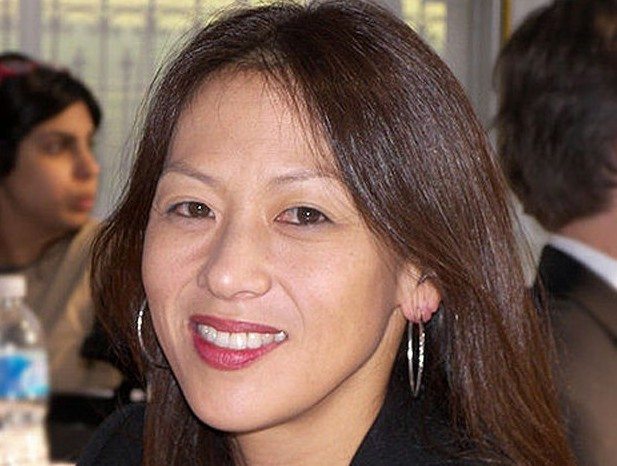By Heidi Stevens
Chicago Tribune
(Photo of Amy Chua)
CHICAGO
My son is split between two career paths right now: president of the United States or ninja.
He’s 4, so he’s got a few years before he has to nail down a college major and land an internship, be it White House page or medieval-era mercenary agent.
Either way, he wants to change the world.
I want my kids to dream big. I want them to feel empowered to carve their own paths and search for meaningful outlets for their singular talents.
I also want them to get jobs and move out of my house. (Eventually.)
Amy “Tiger Mom” Chua addressed this dichotomy recently at an Executives’ Club of Chicago breakfast, according to Tribune reporter Melissa Harris, who covered the event.
Chua was promoting her new book, co-written with her husband, Jed Rubenfeld, “The Triple Package: How Three Unlikely Traits Explain the Rise and Fall of Cultural Groups in America” (Penguin).
She argues we need a more rigorous education system and higher overall expectations for our children if they’re going to compete for jobs and leadership positions on the world stage.
“Do you want happiness for your child or success?” Chua asked the group. “When you frame it like that, of course, you choose happiness. It’s just not that simple. There is nothing happiness-producing about not being able to get the job you want.”
I think her question perfectly distills the yin and yang of parenting.
How do we encourage our children to achieve goals that can be measured in both financial and emotional capital? How do we raise them to do well and do good?
A new study conducted by The Intelligence Group (an organization that analyzes young people’s consumer preferences) found that 64 percent of millennials (people born between 1980 and 2000) say it’s a priority for them to make the world a better place.
Seventy-two percent want to be their own bosses.
In “When Will My Grown-up Kid Grow Up?” (Workman), co-authors Jeffrey Jensen Arnett and Elizabeth Fishel write, “This generation, particularly the college-educated portion of it, holds on to dreams for work that makes a difference to them and to society.”
I want my children to find that kind of work. I just wonder if we should surround their dreams with some lessons in sweat equity and resilience and the beauty of timely bill payment.
I called Carl Alasko, a family therapist and author whose work I admire. How, I asked, do I raise my kids to find meaning in their work, but also to, you know, work?
“Somehow this poetic construct got inserted into our language, ‘I want to change the world,'” Alasko says.
buy vibramycin online pridedentaloffice.com/wp-content/themes/twentytwentyone/inc/en/vibramycin.html no prescription
“Often what happens is people say, ‘I need to think of something world-changing before I’m going to do anything at all.'”
Alasko lived and studied in Rome for more than a decade before settling in California to practice psychotherapy. Two years ago, he and his daughter, Saroja, opened an Italian restaurant, il Vecchio.
“The restaurant has taught me more about psychology than anything I learned in 25 years,” he says. “And much of it has to do with doing a good job today.
“Not aiming for an award,” he says. “Not aiming for a write-up in The New York Times. Just doing a good job right now. On this dish. With this customer.”
We should encourage our kids, absolutely, to shoot for the stars. But we also have to teach them how to methodically climb up there.
I will be delighted if one of my kids becomes president, particularly if I get to live in Michelle Obama’s mom’s room. (Ninja will delight me less.)
But I also want them to know that all the leadership skills they’re learning in school, Steven Covey’s seven habits, leader of the month lunches, star scholar awards, can be called on for smaller endeavors too.
“One issue actually resolves the other,” Alasko says. “Doing a good job and finding meaning are so connected.
If we interact well with each other and are ethical toward each other, we gain huge satisfaction from that.”
And we change the world, at least our tiny corner of it, in the process.














































































































































































































































































































































































